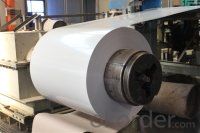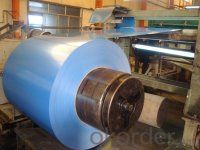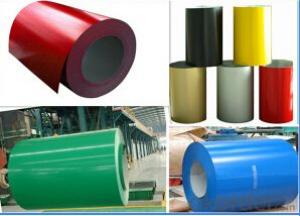PPGI Prepainted Galvanized Rolled Steel Coils
- Loading Port:
- Tianjin
- Payment Terms:
- TT OR LC
- Min Order Qty:
- 30 m.t.
- Supply Capability:
- 10000 m.t./month
OKorder Service Pledge
OKorder Financial Service
You Might Also Like
Description:
Model NO.:Thickness: 0.125--1.3mm*600-1250mm
Type:Steel Coil
Technique:Hot Rolled
Standard:ASTM, GB, JIS
Surface Treatment:Coated
Special Use:High-strength Steel Plate
Pre-Painted Steel Coi:Width: 610/724/820/914/1000/1200/1219/1220/1250mm
Export Markets:North America, South America, Southeast Asia, Africa, Mid East, Eastern Asia
Additional Info.
Trademark:SGCH
Packing:Standard Packing to Export.
Standard:0.2mm*914mm 0.3mm*1000mm
Origin: China
HS Code:721070100
Production Capacity:8000mt/Month
Product Description
Pre-painted Galvanized Steel Coil
PPGI is made by cold rolled steel sheet and galvanized steel sheets as baseplate,
through the surface pretreatment (degreasing, cleaning, chemical conversion
processing), coated by the method of continuous coatings (roller coating method),
and after roasting and cooling.
SPECIFICATION
1.Standard: AISI, ASTM, BS, DIN, GB, JIS
2.Grade: DX51D+Z, DC51D, SPCC, SGCC, SGHC, CGCC,
3.Surface Treatment Coated: Galvanized, Paint sealant, Coating passivation solution
Substrate Cold rolled, Galvanized sheet
4.Color: RAL Color card
5.Coil ID: 508/610 mm
6.Coil weight: 4-10MT
7.Paint film Front side: 10~25um
Back side: 5~10um
8.Zinc layer: 40~180g per square meter
9.Thickness: 0.125~1.3mm
10.Width: 600~1250mm
11.Length: As requirement
12.Type: Steel plate, Steel Coil, Roofing metal
13.Place of origin: Shandong CHINA(mainland)
14.Deliver time: 20-30 days after receipt of advanced t/t or L/C
Advantages
1. Our company produce various specification and models and national standards of galvanized steel coil
2. Using high-quality material and advanced production technology and equipment for processing
3.Applicable to a humid climate and the harsh corrosive environment
4. Products has been all over the country more than 20 provinces, municipalities and
autonomous regions, and have been exported to Europe, North American, the Middle East,
the South East Asia, Africa, Asia,European and other countries and regions, well received by our buyer.


| commodity | prepained Galvanized Steel Coil (PPGI/ PPGL) |
| Techinical Standard: | JIS G3302-1998, EN10142/10137, ASTM A653 |
| grade | TSGCC, TDX51D / TDX52D / TS250, 280GD |
| Types: | For general / drawing use |
| Thickness | 0.125-1.3mm(0.16-0.8mm is the most advantage thickness)) |
| Width | Width: 610/724/820/914/1000/1200/1219/1220/1250mm |
| Type of coating: | PE, SMP, PVDF |
| Zinc coating | Z40-180g/m2 or AZ40-100g/m2 |
| Top painting: | 5 mic. Primer + 15 mc. R. M. P. |
| Back painting: | 5-10 mic. EP |
| Color: | According to RAL standard |
| ID coil | 508mm / 610mm |
| Coil weight: | 4--8MT |
| Package: | Properly packed for ocean freight exportation in 20' ' containers |
| Application: | Industrial panels, roofing and siding for painting / automobile |
| Price terms | FOB, CFR, CIF |
| Payment terms | 20%TT in advance+80% TT or irrevocable 80%L/C at sight |
| delivery time | 25 days after recepit of 20% TT |
| Remarks | Insurance is all risks |
| MTC 3.1 will be handed on with shipping documents | |
| We accept SGS certificatation test |
- Q:What are the common coil finishes available for steel coils?
- The common coil finishes available for steel coils are hot-dip galvanized, galvannealed, electro-galvanized, and organic coated finishes such as painted or coated with polymer films.
- Q:can anyone help me to find any webpage about lists/types of stainless steel?
- Types of stainless steel There are over 150 grades of stainless steel, of which fifteen are most common. The AISI (American Iron and Steel Institute) defines the following grades among others: - 200 Series—austenitic iron-chromium-nickel-manganese alloys - 300 Series—austenitic iron-chromium-nickel alloys Type 301—highly ductile, for formed products. Also hardens rapidly during mechanical working. Type 303—free machining version of 304 via addition of sulfur Type 304—the most common; the classic 18/8 stainless steel Type 316—Alloy addition of molybdenum to prevent specific forms of corrosion - 400 Series—ferritic and martensitic alloys.
- Q:How are steel coils used in the manufacturing of agricultural structures?
- Due to their durability, strength, and versatility, steel coils play a vital role in the manufacturing of agricultural structures. Typically made from high-quality steel, these coils are utilized in various ways throughout the construction process of agricultural buildings such as barns, silos, and storage facilities. One primary application of steel coils in agricultural structures is seen in the creation of the building's framework. The coils are unwound, cut into specific lengths, and then bent, shaped, and welded together to form the structural framework. The exceptional strength and rigidity of steel coils make them an ideal choice for withstanding the heavy loads and harsh environmental conditions commonly found in agricultural settings. Moreover, steel coils are also used in the production of different components and accessories for agricultural structures. These coils can be transformed into panels, roofing sheets, doors, and windows, which are essential elements in constructing agricultural buildings. The ability to customize the shape, size, and thickness of the steel coils allows for flexibility in design and ensures that the finished structure meets the specific requirements of the agricultural application. Furthermore, steel coils play a crucial role in providing protection and safety within agricultural structures. They are employed in fabricating fencing and gates, creating secure boundaries and preventing unauthorized access. Steel coils can also reinforce the walls and floors of the building, enhancing its stability and durability. Additionally, steel coils offer excellent resistance to corrosion, which is particularly important in agricultural structures due to exposure to moisture, chemicals, and other corrosive elements. Their durability ensures that the structure remains intact and functional for an extended period, thereby reducing maintenance and replacement costs. In conclusion, steel coils are indispensable in the manufacturing of agricultural structures. Their strength, durability, versatility, and resistance to corrosion make them an ideal choice for constructing the framework, components, and accessories of these buildings. By utilizing steel coils in the manufacturing process, agricultural structures can be built to withstand heavy loads, harsh environmental conditions, and provide long-lasting protection for agricultural operations.
- Q:What are the common surface finishes for steel coils?
- The common surface finishes for steel coils include hot-dip galvanized, electro-galvanized, and organic coating finishes such as painted or coated with epoxy or polyester.
- Q:Aluminum alloy rolling doors and color steel shutter door that good
- Hello, the shutter door material mainly galvanized steel plate, color steel plate, aluminum alloy, stainless steel, PVC soft board, PVC soft door curtain.
- Q:How do steel coils contribute to the renewable energy sector?
- The renewable energy sector benefits from the utilization of steel coils in multiple ways. To begin with, wind turbines rely on steel coils for their construction. The towers of these turbines are crafted using steel, and structural components are fabricated from steel coils. The exceptional strength and durability of these coils enable them to withstand the harsh environmental conditions commonly found in wind farms. Furthermore, solar panels also depend on steel coils during their production. Steel is utilized to create frames and support structures that securely hold the panels in place. These frames must possess sufficient strength to endure various weather conditions, and steel coils offer the requisite stability and robustness. Additionally, steel coils are essential in the development of transmission lines that transport electricity generated from renewable sources. Steel is widely employed for constructing the poles and towers that support these transmission lines, as it affords the necessary strength to bear the weight of the cables and endure extreme weather conditions. Moreover, energy storage systems, which play a crucial role in storing surplus energy from intermittent renewable sources like wind and solar, are heavily reliant on steel coils. Battery enclosures and racks are fabricated using steel coils to ensure the safety and stability of these systems. In summary, steel coils make a significant contribution to the renewable energy sector by providing the strength, durability, and stability required for various infrastructure components. Their utilization in wind turbines, solar panels, transmission lines, and energy storage systems supports the growth and advancement of renewable energy sources, thus establishing them as an indispensable element in the transition towards a greener and more sustainable future.
- Q:Why does steel with several composites have a greater hardenability from quenching than low carbon steel alloys?Any help would be great
- Bit tricky to explain and I don't know muh about it but steel on its own has lost of gaps in it ( the molecular structure) and when carbon is added thos gaps are filled, I think of it like this: it is easier to punch through expanded polystyrene( with all the little balls) than unexpanded(just a lump of plastic) as the balls are not properly joined and have air pockets between them.
- Q:What are the dimensions of steel coils used in the metalworking tool industry?
- The dimensions of steel coils used in the metalworking tool industry can vary depending on the specific application and requirements of the tool being used. However, there are some common dimensions that are often seen in the industry. Typically, steel coils used in metalworking tools are available in various widths ranging from 24 inches to 72 inches. The thickness of the coils can vary as well, with common thicknesses ranging from 0.020 inches to 0.250 inches. The length of the coils can vary significantly, with standard lengths typically ranging from 100 feet to 2000 feet or more. These dimensions are chosen based on factors such as the type of metal being worked, the specific tool being used, and the desired outcome of the metalworking process. Additionally, other factors such as the weight and handling capabilities of the tool and the efficiency of the manufacturing process may also influence the dimensions of the steel coils used. It is crucial to consult with manufacturers, suppliers, or industry experts to determine the most suitable dimensions for steel coils in the metalworking tool industry, as these dimensions can vary based on specific needs and preferences.
- Q:I need to identify a metal. It is rusty so I suspect it is either iron or steel. Since they both have similar densities and are magnetic, how do I tell the difference betweeen steel and iron?
- Steel is a refined, alloyed metal that is mostly iron. Iron, in a chemistry sense os simply Fe. In an industrial sense iron is pig iron commonly saturated with carbon, up to 4.5% and has other impurities like sulfur. Pig iron is brittle and should break rather easily, and bend very little. After a piece is broken look at the crystal structure, you should see rather small crystals. Most steel made for car body's, washing machines, file cabinets, low grade bolts and nuts etc. should flex and bend before breaking. Most steel made for things like cutting tools, axles, etc, is hardened and will chip and break rather than bend. Also you can try to heat the piece to a glowing orange temperature. It must be very hot. Cool it. If there is a lot of white flake scale on the piece it is impure and probably iron of some sort. In the end the only way exactly tell is have an analysis done and look at the chemistry.
- Q:How are steel coils used in the production of automotive body panels?
- Steel coils are used in the production of automotive body panels by being fed into a stamping press, where the coils are shaped and cut into the desired panel shapes. The high strength and durability of steel make it an ideal material for automotive body panels, providing protection and structural integrity to the vehicle.
1. Manufacturer Overview |
|
|---|---|
| Location | |
| Year Established | |
| Annual Output Value | |
| Main Markets | |
| Company Certifications | |
2. Manufacturer Certificates |
|
|---|---|
| a) Certification Name | |
| Range | |
| Reference | |
| Validity Period | |
3. Manufacturer Capability |
|
|---|---|
| a)Trade Capacity | |
| Nearest Port | |
| Export Percentage | |
| No.of Employees in Trade Department | |
| Language Spoken: | |
| b)Factory Information | |
| Factory Size: | |
| No. of Production Lines | |
| Contract Manufacturing | |
| Product Price Range | |
Send your message to us
PPGI Prepainted Galvanized Rolled Steel Coils
- Loading Port:
- Tianjin
- Payment Terms:
- TT OR LC
- Min Order Qty:
- 30 m.t.
- Supply Capability:
- 10000 m.t./month
OKorder Service Pledge
OKorder Financial Service
Similar products
New products
Hot products
Related keywords




























